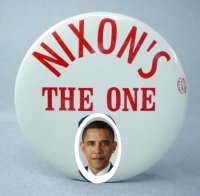Vietnam is every generation's defining struggle, an effort of political will that defines a new Thesis and leaves the side which loses a spent and fading force.
For my generation that's just what Vietnam was, politically. It was the struggle that defined baby boomer politics. Some 40 years ago at this time the struggle was being lost.
It was the Nixon Thesis that would define how we got out of Vietnam, not the hippies and their cultural allies opposing him.
Just to recap it was 40 years ago this month that the My Lai charges came forward and Prince Sihanouk of Cambodia was overthrown. The following month the Cambodian incursion (invasion) would begin, followed in May by the killings at Kent State.
There was no way to tell from the culture, or from the political temperature, that Nixon was winning, was going to win, was going to define American policy for a generation. To the right, from Coverbrowser (and available on eBay) is the March, 1970 cover of GQ.
Fact is, culture and the media often run against politics, especially when a Thesis is new. Lincoln was hated in both the South and North in March, 1862. The Depression seemed to be bowing FDR in March, 1934.
That's where we are on the larger calendar.

Just as the health care debate has politics for our children's generation.
Health care is Barack Obama's Vietnam. He has this week put his foot down, defined and won the essential struggle, and put in place the Thesis — the myths, assumptions and values — that will define American politics from now until (probably) long after I and most of my readers will have died.
What has made the struggle was not his proposal, or his political skill in passing a bill. What has made the struggle is the symbolism of the effort and the political forces allied against it.
I've called these folks "haties." It's a play on the word hippie, and reflects their essential belief in how the Nixon Thesis dominated America. That is they define anyone who disagrees with them as an enemy.
They feel they own the Constitution, that they own patriotism, that only their beliefs are American. Anyone who for any reason believes in, say, universal access to health care, they define as a "socialist," as a "communist," as a "fascist," as a "Nazi." Since the President is black, they can also be called "nigger," and since Barney Frank is gay "faggot" gets tossed into the mix as well.
These people are, and have been, the vanguard of American business interests. But what Democrats have done, very quietly, is to divide these interests. Not all businesses are sellers of health care and services, people who lose under the new law. Most are buyers of such care and services, and will doubtless benefit — more and more as time goes on — from changing our attitude toward this essential product.
Beyond the specifics of the bill (and most Democrats don't really like it) it's this shift in attitude that is most important. It's a shift in health care from an option to a right. In particular, it's the assumption that preventive services of all kinds — check-ups, data, propaganda — must be deployed against everyone's attempts to get lazy, fat, tobacco-addicted, drunk, disorderly, and crazy.
Lazy, fat, drug-addled and crazy are natural elements in the human condition. Under the Nixon Thesis these are choices. Only those on "our side" deserve care (never mind that Nixon proposed health care reform more liberal than what just passed), just as only those on "our side" deserve the other benefits of government.
Only by bringing everyone into the health care pool, only by delivering everyone a full range of preventive services, can we start to bring health care costs down. And only by defining when we will say "no" to care, from a common pool, can we really finish the job.
This last is something the new law does not acknowledge, but it's coming. In fact, that element of reform has already passed, with the stimulus. It was called the HITECH Act. It puts $19.2 billion into buying computers and networks that will collect data, automate payments, and make comparative effectiveness possible.
Comparative effectiveness will tell us what the most cost-effective treatments are, and increasingly — first through private insurance, then through public programs like Medicare — that's all we'll pay for from the common pool.
Both private insurance and public health care are common pools of money, funds held by some trustee on behalf of the bulk of the people, defining basic care. This is how every democratic country operates. The care offered through the common pool is defined, and past that you're on your own.
No one wants to admit that. Attempts to impose that discipline, through the "managed care" movement of the 1990s, failed. The runaway health inflation of the last decade was driven mainly by this failure. There was no thumb on the health care cost scale, placed there by a buyer big enough to make a difference, big enough to face down a doctor who wanted to administer a long battery of tests before performing a common treatment, or administer the most expensive drug they could write on a pad rather than the generic.
Now there will be. Data will determine what doctors should do in each situation, and gradually exceptions will be ground down. This will take time. Savings won't be quick. But over time the percentage of national income that comes from the common pool will fall into line with the percentages paid by our trading rivals.
In the course of that America will become less "exceptional," more like any other country. This is an essential feature of the Obama Thesis. It's the nub of the thing that drives his most violent opposition. They want to think we're exceptional, that we're "better" than other people, different. They call it "freedom," but other nations deride it as "license." (Given the age of the Tea Party protesters, it's not ridiculous to think some haties were hippies back in the day.)
Now the balance begins to shift.
But I'm getting 
Many more momentous events are coming. Some will be violent. The economy is not going to heal overnight. But a direction has been set, not only for where we'll proceed — toward a new normalcy matching that of the rest of the world — but how we'll get there — in a measured way, with as much calm as we can, defining as many inside the discussion as want to participate, gradually wearing the hate down until our children will wonder, some day, what the fuss was all about.
And who did this?
Obama was the one.











Where do I begin with this? I agree that politics has been very divided lately, but to label those on the right as “Haties” without also acknowledging the hate-filled rhetoric of the Left is disingenuous. The problem is that both sides see people with differing opinions as stupid, evil, and/or as an enemy. It is actually a very juvenile point of view. I am both anti-abortion and anti-death penalty. Yet, I do not consider people who are pro-abortion and pro-death penalty evil or stupid. I understand their points of view, and respect them (at least the reasoned ones).
But, to the topic: I agree that there must be heathcare reform in this country. The idea that companies can deduct health insurance costs but individuals can’t is crazy. The idea that healthcare insurance should be provided by employers at all is crazy – why? You lose your job, you lose coverage (defacto, almost, since COBRA is so incredibly expensive). The fact that the bill under discussion doesn’t even touch torte costs is ludicrous.
If I were to wave the magic wand, I would propose:
1. The US is the pool for coverage.
2. No pre-existing conditions.
3. Serious torte reform, with guidelines to prevent bad doctors from practice.
4. Remove the link between having health insurance via your job. Just have it.
5. Allow health insurance and healthcare costs to be tax deductible.
Don’t force people to buy insurance. I hate the comparison between compulsive health insurance and compulsive auto insurance. You can always opt of of having a car. You cannot opt out of having a body.
Start with that, and then go from there. That will clean up a lot.
Where do I begin with this? I agree that politics has been very divided lately, but to label those on the right as “Haties” without also acknowledging the hate-filled rhetoric of the Left is disingenuous. The problem is that both sides see people with differing opinions as stupid, evil, and/or as an enemy. It is actually a very juvenile point of view. I am both anti-abortion and anti-death penalty. Yet, I do not consider people who are pro-abortion and pro-death penalty evil or stupid. I understand their points of view, and respect them (at least the reasoned ones).
But, to the topic: I agree that there must be heathcare reform in this country. The idea that companies can deduct health insurance costs but individuals can’t is crazy. The idea that healthcare insurance should be provided by employers at all is crazy – why? You lose your job, you lose coverage (defacto, almost, since COBRA is so incredibly expensive). The fact that the bill under discussion doesn’t even touch torte costs is ludicrous.
If I were to wave the magic wand, I would propose:
1. The US is the pool for coverage.
2. No pre-existing conditions.
3. Serious torte reform, with guidelines to prevent bad doctors from practice.
4. Remove the link between having health insurance via your job. Just have it.
5. Allow health insurance and healthcare costs to be tax deductible.
Don’t force people to buy insurance. I hate the comparison between compulsive health insurance and compulsive auto insurance. You can always opt of of having a car. You cannot opt out of having a body.
Start with that, and then go from there. That will clean up a lot.
Sigh. Identifying hate is not hate. Calling out those who called my Congressman a “nigger” as he walked to vote yesterday and who have done similar things throughout this debate, that’s not hate.
Neither is identifying murderers — and the Bush Administration aided and abetted hundreds of thousands of murders — hate.
Your parameters of “hate speech” and your “a plague on both their houses,” followed by a recitation of Republican talking points, is simply an avoidance of responsibility, both for the hatred and crimes on your side of the aisle.
A civil debate must have boundaries. Until you run the haters out of your ranks you will get nowhere. The haters were driven from Democratic ranks long ago, by an entire generation of lost elections and lost opportunities. Those Democrats who espouse true hatred and dehumanization have been ridden out of the party’s leadership methodically. They have not been ridden out of the Republican Party leadership, as I saw repeatedly in the debate yesterday.
The Nixon Thesis will fade, but it will fade slowly. What happened yesterday is just the first step down a long road. And you have a long distance to travel before your side can be trusted with power.
You can start by tossing the John Birch Society out of CPAC, by the way. They had been ridden out a generation ago but allowed back in as a sponsor this year.
Then deny the racists any standing — including those who fly the Confederate flag on their bumpers, and honestly stare down those a-holes who call Obama “Hitler” or “Communist.”
Don’t say that a few fringe elements who have no power or influence over policy are the equivalent of your loudest and most successful voices. That’s false equivalence. I’m not playing that game any more.
The Tea Party is just the same as yesterday’s leftist fringe. There is no difference between Jerry Rubin and Glenn Beck. Ride them out or accept the consequences.
Sigh. Identifying hate is not hate. Calling out those who called my Congressman a “nigger” as he walked to vote yesterday and who have done similar things throughout this debate, that’s not hate.
Neither is identifying murderers — and the Bush Administration aided and abetted hundreds of thousands of murders — hate.
Your parameters of “hate speech” and your “a plague on both their houses,” followed by a recitation of Republican talking points, is simply an avoidance of responsibility, both for the hatred and crimes on your side of the aisle.
A civil debate must have boundaries. Until you run the haters out of your ranks you will get nowhere. The haters were driven from Democratic ranks long ago, by an entire generation of lost elections and lost opportunities. Those Democrats who espouse true hatred and dehumanization have been ridden out of the party’s leadership methodically. They have not been ridden out of the Republican Party leadership, as I saw repeatedly in the debate yesterday.
The Nixon Thesis will fade, but it will fade slowly. What happened yesterday is just the first step down a long road. And you have a long distance to travel before your side can be trusted with power.
You can start by tossing the John Birch Society out of CPAC, by the way. They had been ridden out a generation ago but allowed back in as a sponsor this year.
Then deny the racists any standing — including those who fly the Confederate flag on their bumpers, and honestly stare down those a-holes who call Obama “Hitler” or “Communist.”
Don’t say that a few fringe elements who have no power or influence over policy are the equivalent of your loudest and most successful voices. That’s false equivalence. I’m not playing that game any more.
The Tea Party is just the same as yesterday’s leftist fringe. There is no difference between Jerry Rubin and Glenn Beck. Ride them out or accept the consequences.